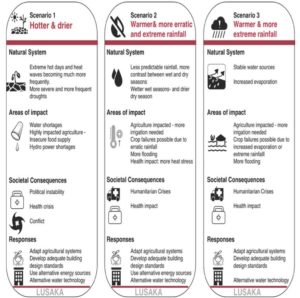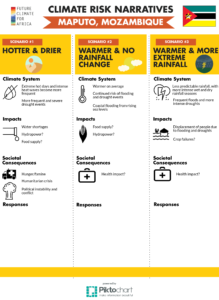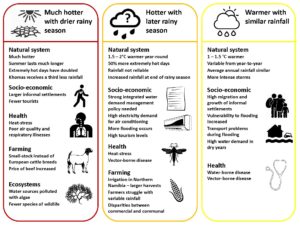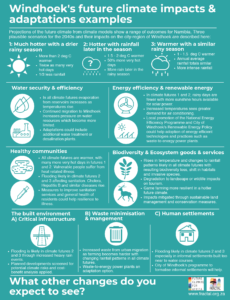Local Authorities Awareness Workshop on Climate Change and Decision-Making June 2019
Local government in Windhoek is central to implementing mitigation, adaptation and disaster risk reduction methods that are needed to protect the city and its residents. FRACTAL hosted a workshop with representatives from Local Authorities in order to help them plan for and develop climate resilient communities. The workshop report is available here.
Climate Change Awareness Workshop for City of Windhoek Junior Council: Report April 2019
This FRACTAL led workshop, brought together City of Windhoek Junior Councillors to discuss and raise awareness of climate change. It aimed to inspire the next generation of leaders to take action around climate change challenges.
The report is available here.
Exploring perspectives that underpin decisions for southern African urban development April 2019
The FRACTAL team found very complex decision spaces in the rapidly growing southern African cities where the project was working. As a result, an innovation fund project was designed to unpack and consider real case studies of decisions that have been made in three FRACTAL cities: Lusaka, Harare and Blantyre. The case studies enabled researchers to explore the similar themes that emerged. There was a strong economic development value at the core of all three decisions, coupled with environmental and social well being values. You can download the full Innovation Fund Report and read the independent reports for the case studies in Lusaka, Harare and Blantyre.
National Adaptation Planning Guidance April 2019
Two documents offering guidance on National Adaptation Planning for Windhoek and Maputo.
Strategic Executive Transformational Leadership on Climate Change: Windhoek March 2019
At this engagement in Windhoek, Strategic Executives undertook a range of activities to explore how climate change could be mainstreamed into city planning processes and decisions.
Harare Policy Brief January 2019
This policy brief focuses on the water sector in Harare, drawing on discussions around decision-making and climate resilience in the city under the FRACTAL project. It was funded by a grant from IDRCAfrican Climate Leadership Program (AfriCLP), the Natural Environment Research Council (NERC) and START’s Africa Global Environmental Change (GEC) project (administered by FRACTAL).
Lusaka Policy Briefs December 2018
Policy briefs were co-developed by FRACTAL and LuWSI (Lusaka Water Security Initiative) with contributions from a range of Lusaka city stakeholders. The policy briefs were presented to a high-level panel including ministerial representatives in Lusaka at the final Learning Lab in November 2018. They included briefs on Groundwater Pollution, Groundwater Levels and Flooding.
Fifth Lusaka Learning Lab November 2018
FRACTAL hosted its final Learning Lab in Lusaka in November. Four policy briefs were presented around water issues in the city. With water as a central theme for the Lab, participants visited Kafue Gorge Hydropower Station.
Gabarone City FRACTAL-Narratives Stakeholder Feedback Workshop October 2018
FRACTAL has funded a City Narratives Development Initiative in Gabarone, Blantyre and Harare. Narratives are useful tools, which enable specialist knowledge, such as that of climate scientists to be integrated with contextual knowledge, such as that of decision-makers. Researchers in Blantyre, Gaborone and Harare have developed future narratives for a particular sector in their city for the year 2040. Climate scientists will validate these narratives in terms of plausible climate futures.
Second Maputo City Dialogue September 2018
Water scarcity was identified during the Learning Labs as a burning issue. This second City Dialogue therefore focussed on the issue of management of water in the Greater Maputo region and also considered the decision-making process.
Lusaka City Governance Dialogue and Talanoa Dialogue August 2018
Two dialogues took place in Lusaka. The Governance Dialogue considered FRACTAL’s research so far, unpacking terminology and looking at seasonal forecasting. Four policy briefs were discussed and began to be developed. They were published in December. The Zambia Talanoa Dialogue was run alongside FRACTAL’s Governance Dialogue. Framed during the United Nations Conference on Climate Change in 2017 (COP23), Cities and Regions Talanoa Dialogues are being organised in countries around the world as a way to convene all levels of government to consider their countries’ Nationally Determined Contributions ahead of COP24 and future contributions. A report on both dialogue processes is available here.
Third Windhoek Learning Lab August 2018
At this, the third, engagement with stakeholders in Windhoek, the FRACTAL team used the climate risk narratives as a tool to open up conversations about climate-related issues. The bigger issues that were drawn out included water and urban development.
Windhoek Water Security: Final Project Report for 2016 START Grants for Global Change in Africa July 2018
Under the FRACTAL umbrella, START funded a project looking into Windhoek’s water security. UJAMS Waste Water Treatment Plant (UWWTP) was used as a case study to investigate governance and policy analysis in relation to water security in Windhoek. The study revealed the different actors that were involved in discussions and decision-making around water supply to industry, pollution from industry and the need to find diverse alternatives to the water insecurity issues leading up to the establishment of UWWTP. An analysis of the Water Management Plan for City of Windhoek 2017 and also the Transformational Strategic Plan (2017-2022) the city’s policies revealed only limited mainstreaming of climate change related issues despite Namibia’s introduction of a Climate Change Policy, Strategy and Action Plan.
Second Maputo Learning Lab May 2018
The FRACTAL team held a second learning lab in Maputo in May. Issues that were opened up for discussion included water shortages and the vulnerability of coastal communities and infrastructure to climate change related events.
Windhoek Transformational Leadership on Climate Change Training April 2018
In partnership with FRACTAL, the University of Namibia and the City of Windhoek hosted a Transformational Leadership on Climate Change training on 18th-19th April 2018. The training aimed to equip decision-makers with knowledge that will allow them to move away from the ‘business as usual’ way of decision-making, a requirement for the development of climate resilience cities.
Climate risk narratives for Lusaka April 2018
FRACTAL’s climate research team, led by researchers at the MET Office Hadley Centre and the University of Cape Town’s Climate Systems Analysis Group, has developed climate risk narratives for the city of Lusaka. They were presented at a training session and were generated using climate modelling tools. The notes from the climate training session are available here.
The risk narratives for Lusaka show three possible future scenarios.

Climate risk narratives for Maputo April 2018
FRACTAL’s climate research team, led by researchers at the MET Office Hadley Centre and the University of Cape Town’s Climate Systems Analysis Group, has developed climate risk narratives for the city of Maputo. The risk narratives show three possible future scenarios.
Climate risk narratives and climate information for Windhoek April 2018
FRACTAL’s climate research team, led by researchers at the MET Office Hadley Centre and the University of Cape Town’s Climate Systems Analysis Group, has developed climate risk narratives for the city of Windhoek. The risk narratives show three possible future scenarios. They have also developed a Future Climate Impacts Infographic.
This research was funded by the SysTem for Analysis, Research and Training (START) through the Global Environmental Change (GEC) Programme. The research team included Prof John Mfune, Prof Lawrence Kazembe, Dr Ndeyapo Nickanor and Mr Gerhard Iiputa (University of Namibia (UNAM)), Dr Earl Lewis (UNAM Multidisciplinary Research Centre) and Mr Johannes Sirunda (NamWater).
Fourth Lusaka Learning Lab March 2018
This fourth Learning Lab set out to explore some of the key issues identified in the third Learning Lab that would be developed into a series of policy briefs. The report can be found here.
First Maputo City Dialogue February 2018
In collaboration with Maputo Municipal Council and Eduardo Mondlane University, FRACTAL facilitated a dialogue around climate change and the water sector in Maputo.
Third Lusaka Learning Lab November 2017
A third Learning Lab was held in Lusaka at the end of November 2017. This Lab was centred around the issue of water security and quality, and included several field trips. The Climate Risk Narratives were also updated.
Windhoek Learning Lab 2: workshop report October 2017
The Windhoek Second Learning Lab took place on 31st October 2017 at Heja Lodge with 40 participants in attendance. This Learning Lab was focused on City of Windhoek Officials. It aimed to raise awareness about the proposed City of Windhoek’s Climate Change Strategy and Action Plan, which is being led by the City’s Division of Environmental Management.
START-Global Environmental Change (GEC) city learning exchange: Harare and Windhoek August 2017
The Chinhoyi University of Technology (CUT) research project title is “Water and energy system, urban governance and decision-making in Harare” and the University of Namibia (UNAM) research project is titled “Water Security in Windhoek: governance, water demand and supply, and livelihoods in the context of urbanization and climate change”. In August 2017, Harare stakeholders visited Windhoek to learn about both passive and active adaptation management strategies of Windhoek to compare the risks and vulnerabilities in the energy and water sector with Harare. This report provides a summary of activities that were undertaken during the Harare-Windhoek exchange visit.
Lusaka Learning Lab 2: workshop report June 2017
The second Lusaka learning lab took place in June 2017. This lab followed on from this first, during which burning issues were identified. The second lab provided an opportunity to share feedback on some activities that had stemmed from the first learning lab, and resulted in the development of four city-based thematic groups to identify knowledge gaps.
Maputo Learning Lab 1: workshop report March 2017
The first Maputo Learning Lab was held 06-07 March 2017 at the Radisson Blu Hotel & Residence in Maputo. The meeting was attended by approximately 30 representatives from government entities, foreign and international NGOs, scientific entities, civil society, among others. Environmental problems caused by climate change and variability in the municipality were presented and the possible solutions thereof discussed as well as existing projects and programmes. This report covers the learning lab activities.
Windhoek Learning Lab 1: workshop report March 2017
The first Windhoek City learning lab, which took place on 14 &15 March 2017, brought together stakeholders from a variety of organisations with the objective of framing relevant “burning issues” that would become the foci (pilot studies) for FRACTAL in Windhoek. This report covers the learning lab activities.
Lusaka dialogue 1: Lusaka Water Resources and Climate Change January 2017
The city dialogue was a follow-up engagement from the learning lab, which was held in September 2016. At the learning lab, climate change issues were discussed with various stakeholders from the water, energy and food sector. At this event, stakeholders in Lusaka called for continued dialogue on climate change and water issues in the city. This dialogue brought together researchers and practitioners in the field of water and climate change from Zambia and South Africa.
Lusaka training of city councillors January 2017
The training that was carried out in January 2017 was conceptualized within the FRACTAL project, which has the main goal of integrating relevant climate information into city level decision making. The opportunity to provide this training was identified by Brenda Mwalukanga, the embedded researcher in Lusaka.
Lusaka Learning Lab 1: workshop report September 2016
As part of the planned activities in the FRACTAL project for Lusaka, the inception workshop was held on 6th September 2016 to engage stakeholders working in the water and energy sectors in the City of Lusaka. This was followed by the first learning lab session on 7th September 2016 to discuss the burning issues within the City of Lusaka around the energy and water sector. This report covers both the inception workshop and learning lab activities.



